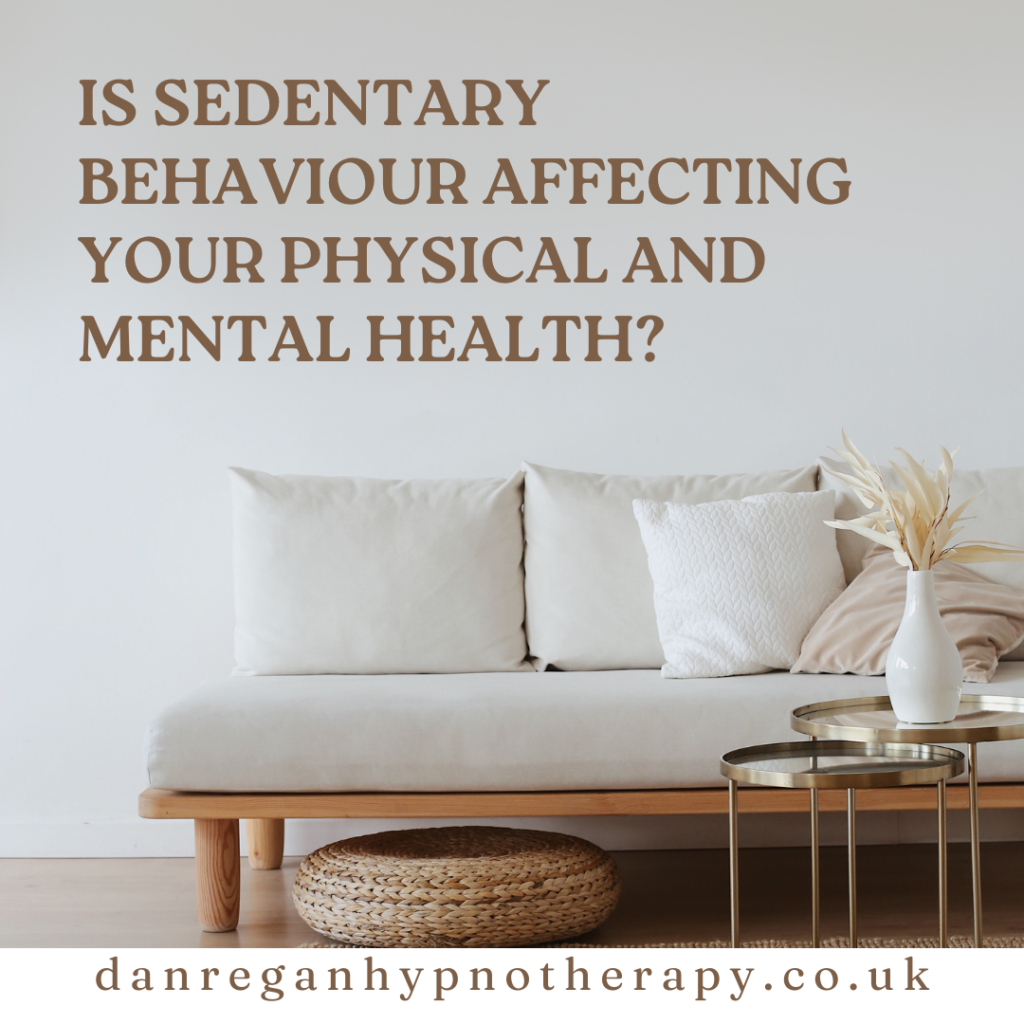
Is Sedentary Behaviour Affecting your physical and mental health?
I’ve written many times before about the value of exercise and getting moving to boost your physical and mental health. In my own life my exercise is now a central part of how I prioritise my physical and mental health and I can really notice the difference if I miss my training for a while.
Yet it isn’t just because I enjoy it that I promote getting moving; it’s because research upon research demonstrates that getting active brings benefits physically and mentally. Getting moving and exercise improve our mental health, boost our mood, can reduce symptoms of depression and help reduce anxiety.
As if that wasn’t enough a recently published report looked at the impact of sedentary behaviour in the UK and, in looking at the cost burden on the NHS of sedentary lifestyles, once again highlighted the negative impacts on health.
The Health Impacts of Just Sitting Around
Sedentary behaviour refers to sitting or lying while expending low amounts of energy. Spending 6-8 hours a day sitting around like this increases the risk of cardiovascular disease, type 2 diabetes and numerous other health conditions. Perhaps worryingly, thirty percent of adults in the UK are sedentary for 6-8 hours a day during the week and this rises higher over the weekend. The risk of chronic disease is greatly increased if you live this kind of lifestyle where you spend many hours sitting at work, in the car and even for leisure activities.
A recent report (Heron et al. 2019, full reference below) looked at the direct costs of sedentary behaviour in the UK. They reported that,
“This cost of illness analysis found that prolonged sedentary behaviour costs the UK NHS £0.8 billion in the financial year 2016-2017…The results suggested that 11.6% of all cause mortality was associated with sedentary behaviour. Therefore, 69,276 deaths might have been avoided in 2016 if sedentary behaviour was eliminated in the UK.”
And so a lifestyle that involves a lot of sitting around could actually end up ruining your physical health and increases the risk of illness and death.
This report was specifically looking at the financial burden on the NHS; the burden on individuals and their families of illness, sickness and death isn’t measured but must also be substantial. Having serious health issues is likely to create increased anxiety, stress, worry, depression and possibly pain and discomfort (as well as impacting on quality of life).
There are also reported links between sedentary behaviour and other issues, including mental health disorders.
And as the NHS website writes regarding this particular report, “this research supports health advice to reduce the amount of time spent sitting“. In truth, not only should we reduce sitting for our physical and mental health but we should increase physical exercise too.
Anxiety, Depression & Exercise
Recently I wrote all about the benefits of exercise for depression (read that blog here: Depression: Does aerobic exercise have anti-depressant effects?). In summary, both aerobic and anaerobic exercise appear to help in reducing symptoms of depression.
Morres et al. (2018) carried out a systematic review and meta-analysis to examine the anti-depressant effects of aerobic exercise (versus non-exercise comparators) for depressed adults (18-65 years) recruited through mental health services with a referral or clinical diagnosis of depression.
In conclusion, the research found that aerobic exercise “showed a significant large overall anti-depressant effect” on adult patients with depression. Aerobic exercise “brought about a large or moderate to large improvement in depression in a wide range of delivery formats through equipment-based or equipment-free modalities, inside or outside a hospital, outdoors or indoors, in groups or individually, and in cohorts with outpatients or inpatients, and with different depressive symptom severity.”
Another meta-analysis by Stathopoulou et al, (2006) looked at treatment outcomes from exercise for depression and some other mental health issues. Their analysis suggested that anaerobic exercise may be equally effective in reducing depressive symptoms compared to aerobic activity, which suggests that resistance training may be an option for those where aerobic exercise is inappropriate or where they do not have the motivation for aerobic exercise. They also found from their analysis that there was evidence to suggest significant benefit from exercise to help with cravings from alcohol abuse, specific thoughts associated with bulimia and for anxiety related symptoms.
There may be many psychological reasons for the mental health benefits of exercise for depression and anxiety. Engaging in exercise may increase perceived coping skills, may alter the accessibility or intensity of ruminations, worries and anxiety and it involves being active which is of course inconsistent with the natural action tendencies associated with depression (passivity) and anxiety (avoidance).
And so being less sedentary is good for your physical and mental health and being active is even better.
I’ve also written before about more mental health benefits from exercise (read it here: Exercise & Mental Health – Depression, Stress & Memory) which suggest that running may protect our memory from the impact of stress, could help prevent depression and manage the symptoms of depression and exercise may keep our brains healthier for longer as we age.
There is also research evidence that exercise can help with the treatment of anxiety. Regular exercise has been associated with lower anxiety and depression (Moor et al. 2016), exercise has demonstrated a reduction in anxiety (Petruzzello et al, 1991) and exercise decreased overall anxiety sensitivity (Broman-Fulks et al. 2004).
The overall conclusion is pretty clear isn’t it? If you want to reduce the risks of several major health conditions then reduce the amount of time spent sitting around during your day. And if you want to reduce depression and anxiety symptoms and enjoy better mental health then start incorporating exercise into your schedule. Good mental health is not a passive affair so make the commitment to making exercise happen and, according to research and anecdote, you will very likely enjoy the positive benefits.
To your success,
Dan Regan
Hypnotherapy in Ely & Newmarket
Read more articles about anxiety, depression and mental health here: Hypnotherapy Articles
Seeking help to overcome your anxiety and depression? Book your Complimentary Hypnotherapy Strategy Session with Dan now: Appointments
Find out what other people have said after their hypnotherapy sessions with Dan: What People Say
And check out these powerful hypnosis downloads that can start helping you right away: Hypnosis Downloads
References:
Heron L, O’Neill C, McAneney H, et al. Direct healthcare costs of sedentary behaviour in the UK. J Epidemiol Community Health Published Online First: 25 March 2019. doi: 10.1136/jech-2018-211758
NHS Commentary: Does prolonged sitting really kill 70,000 people a year in the UK? https://www.nhs.uk/news/lifestyle-and-exercise/does-prolonged-sitting-really-kill-70000-people-year-uk/
Morres, Ioannis D., Antonis Hatzigeorgiadis, Afroditi Stathi, Nikos Comoutos, Chantal Arpin‐Cribbie, Charalampos Krommidas, and Yannis Theodorakis. “Aerobic exercise for adult patients with major depressive disorder in mental health services: A systematic review and meta‐analysis.” Depression and anxiety 36, no. 1 (2019): 39-53.
Stathopoulou, Georgia, Mark B. Powers, Angela C. Berry, Jasper AJ Smits, and Michael W. Otto. “Exercise interventions for mental health: a quantitative and qualitative review.” Clinical psychology: Science and practice 13, no. 2 (2006): 179-193.
Petruzzello, S.J., Landers, D.M., Hatfield, B.D., Kubitz, K.A. and Salazar, W., 1991. A meta-analysis on the anxiety-reducing effects of acute and chronic exercise. Sports medicine, 11(3), pp.143-182.
De Moor, M.H.M., Beem, A.L., Stubbe, J.H., Boomsma, D.I. and De Geus, E.J.C., 2006. Regular exercise, anxiety, depression and personality: a population-based study. Preventive medicine, 42(4), pp.273-279.
Broman-Fulks, J.J., Berman, M.E., Rabian, B.A. and Webster, M.J., 2004. Effects of aerobic exercise on anxiety sensitivity. Behaviour research and therapy, 42(2), pp.125-136.




0 Comments